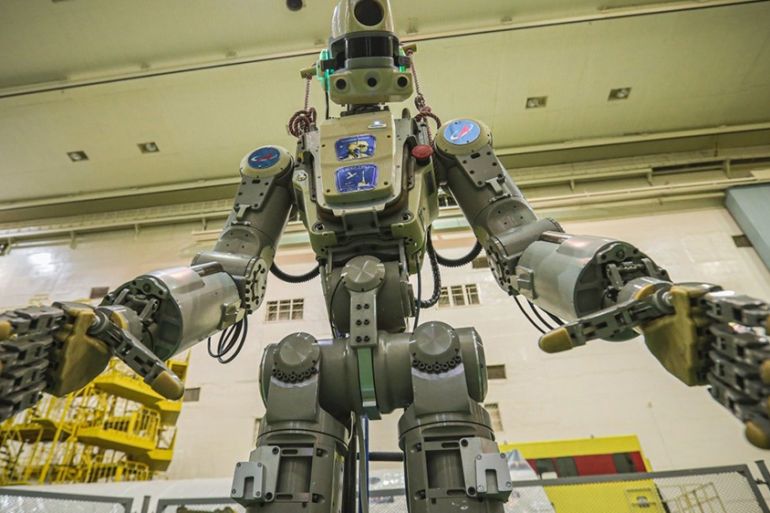Soyuz rocket carrying Russian robot docks with space station
The Fedor robot will spend 10 days on the International Space Station, learning tasks performed by astronauts.

The Russian Soyuz space capsule carrying the human-like robot Fedor has docked with the International Space Station (ISS), days after the first attempt to dock with the ISS failed.
Fedor, which stands for Final Experimental Demonstration Object Research, is the first humanoid robot sent into space by Russia, and it will learn from and assist with small tasks performed by the astronauts.
Keep reading
list of 4 itemsPhotos: Mexico, US, Canada mesmerised by rare total solar eclipse
Moment total solar eclipse occurs in North America
Millions across North America await total solar eclipse
It will only remain on the ISS for 10 days, coming back to Earth on September 7.
The robot is the size of a human adult and can emulate movements of the human body using its robotic hands, which have fingers that can hold equipment such as screwdrivers and fire extinguishers.
On the official Fedor Twitter account, its handlers jokingly wrote “sorry for the delay, I was stuck in traffic” after the Soyuz capsule attached to the space station.
Прошу прощения за задержку. Застрял в пробке. Готов к продолжению работы. pic.twitter.com/iR277q5Mxo
— FEDOR (@FEDOR37516789) August 27, 2019
The Soyuz rocket was launched last Thursday from a launch pad in Kazakhstan.
Usually, Soyuz rockets are manned for these missions, but in order to test a new emergency rescue system, it remained unmanned this time around.
On Saturday, its first docking attempt failed due to issues related to the automatic docking system.
Tuesday’s attempt to dock with the space station, however, was successful.
The Soyuz MS-14 is home at the Zvezda module! Contact and capture confirmed at 11:08 pm ET. https://t.co/cBNqC5JGaz pic.twitter.com/vc04xod0sm
— Intl. Space Station (@Space_Station) August 27, 2019
Fedor is not the first humanoid robot sent to space. In 2011, US space agency NASA sent Robonaut 2 to the ISS, where it performed tasks in hazardous environments.
In 2013, Japan also sent a small robot into space, called Kirobo.